Grand UK Holiday: Improving Training using Social Cognitive Theory
VerifiedAdded on 2023/06/18
|12
|2775
|299
Case Study
AI Summary
This case study examines Grand UK Holiday, a tour company specializing in escorted tours for the elderly, through the lens of social cognitive theory. It analyzes the personal, environmental, and behavioral factors influencing staff training and performance. The report identifies issues such as existing staff feeling overconfident or intimidated by training, concerns about new staff engagement, and the impact of environmental factors like health crises and organizational culture. It further explores how social cognitive factors like self-efficacy and social norms affect employee behavior, highlighting clashes between new and existing staff and the potential for positive outcomes through improved training and incentives. The analysis connects these factors to Bandura's theory, emphasizing the interplay between personal beliefs, environmental influences, and behavioral intentions within the organization. Desklib provides solved assignments for students.
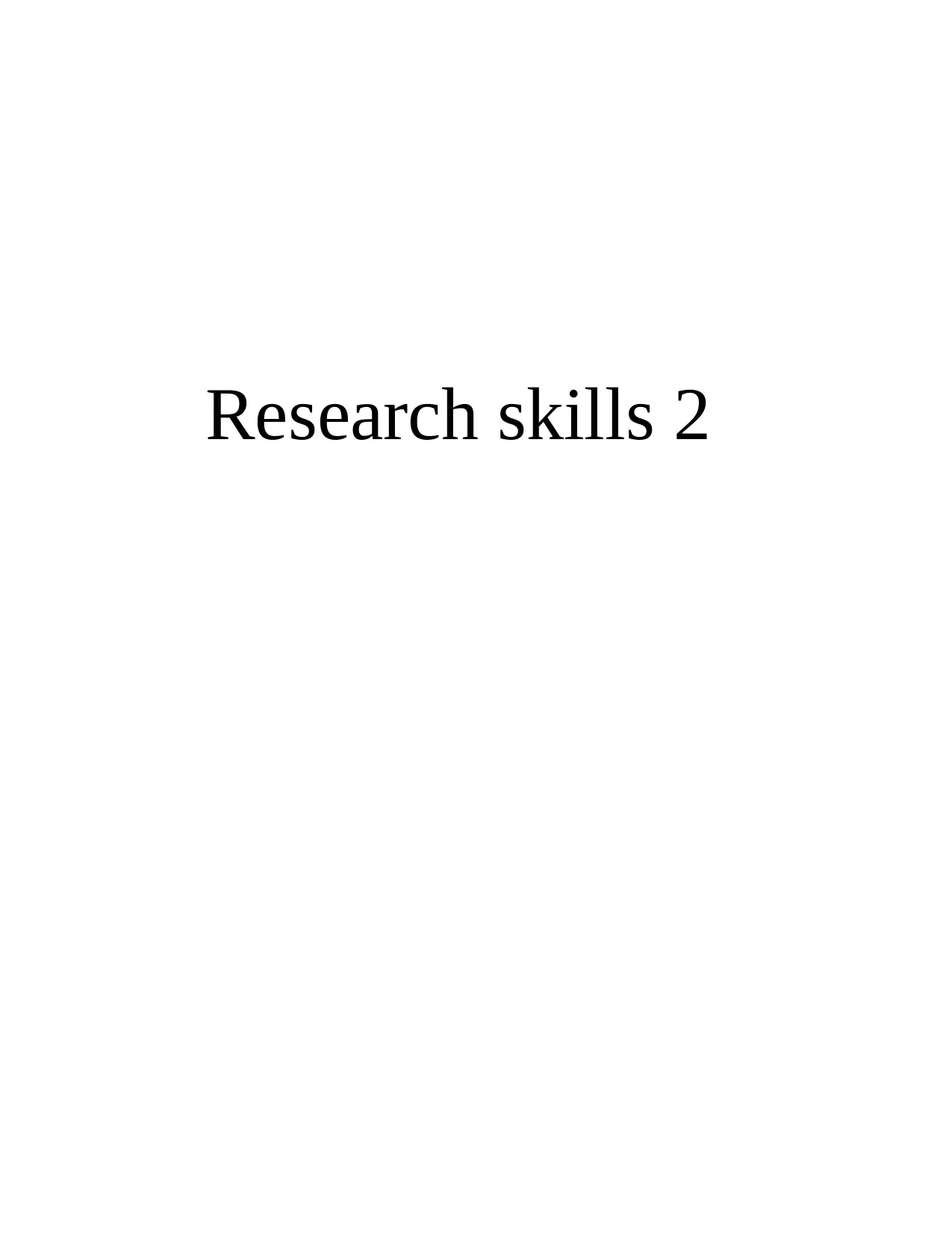
Research skills 2
Paraphrase This Document
Need a fresh take? Get an instant paraphrase of this document with our AI Paraphraser
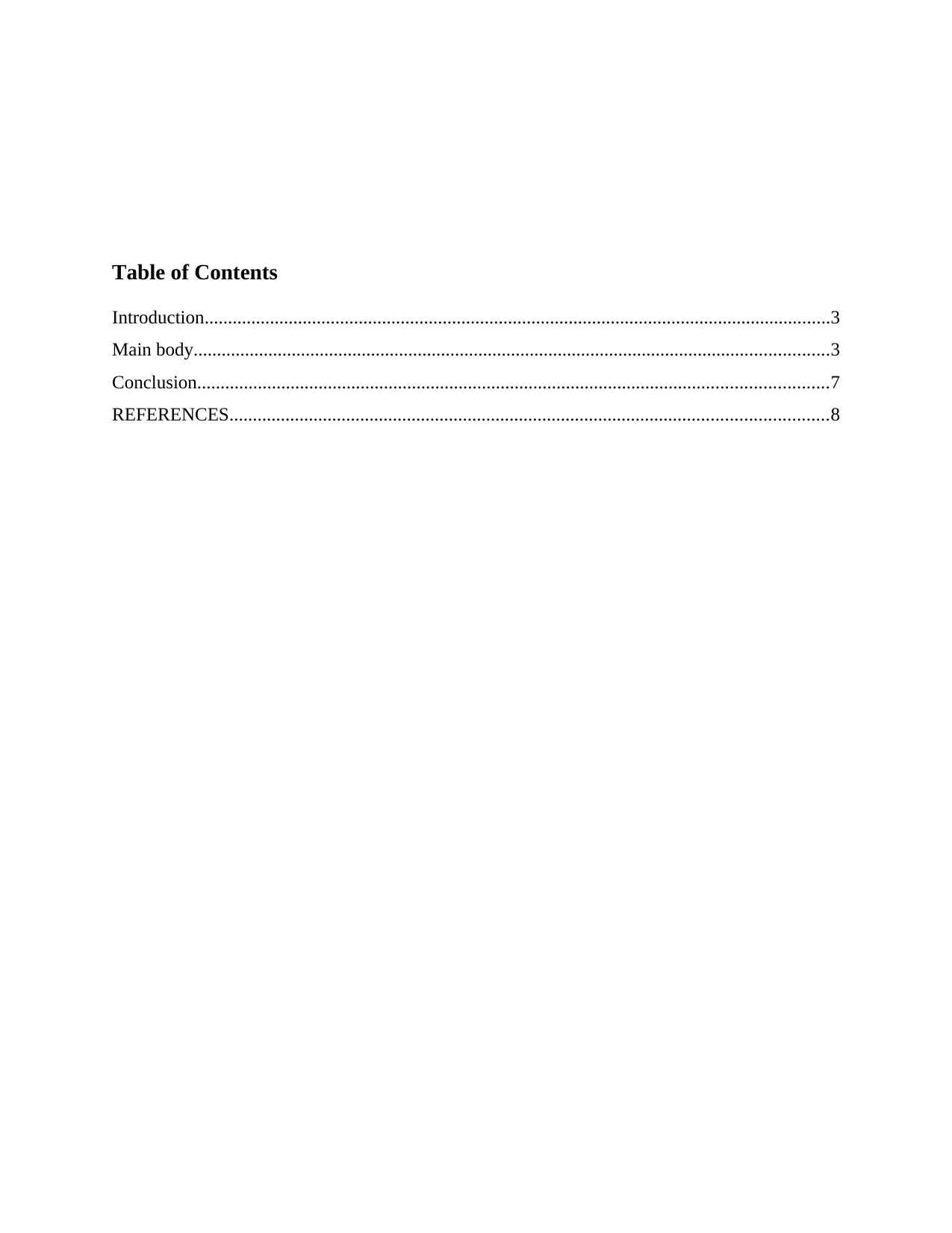
Table of Contents
Introduction......................................................................................................................................3
Main body........................................................................................................................................3
Conclusion.......................................................................................................................................7
REFERENCES................................................................................................................................8
Introduction......................................................................................................................................3
Main body........................................................................................................................................3
Conclusion.......................................................................................................................................7
REFERENCES................................................................................................................................8
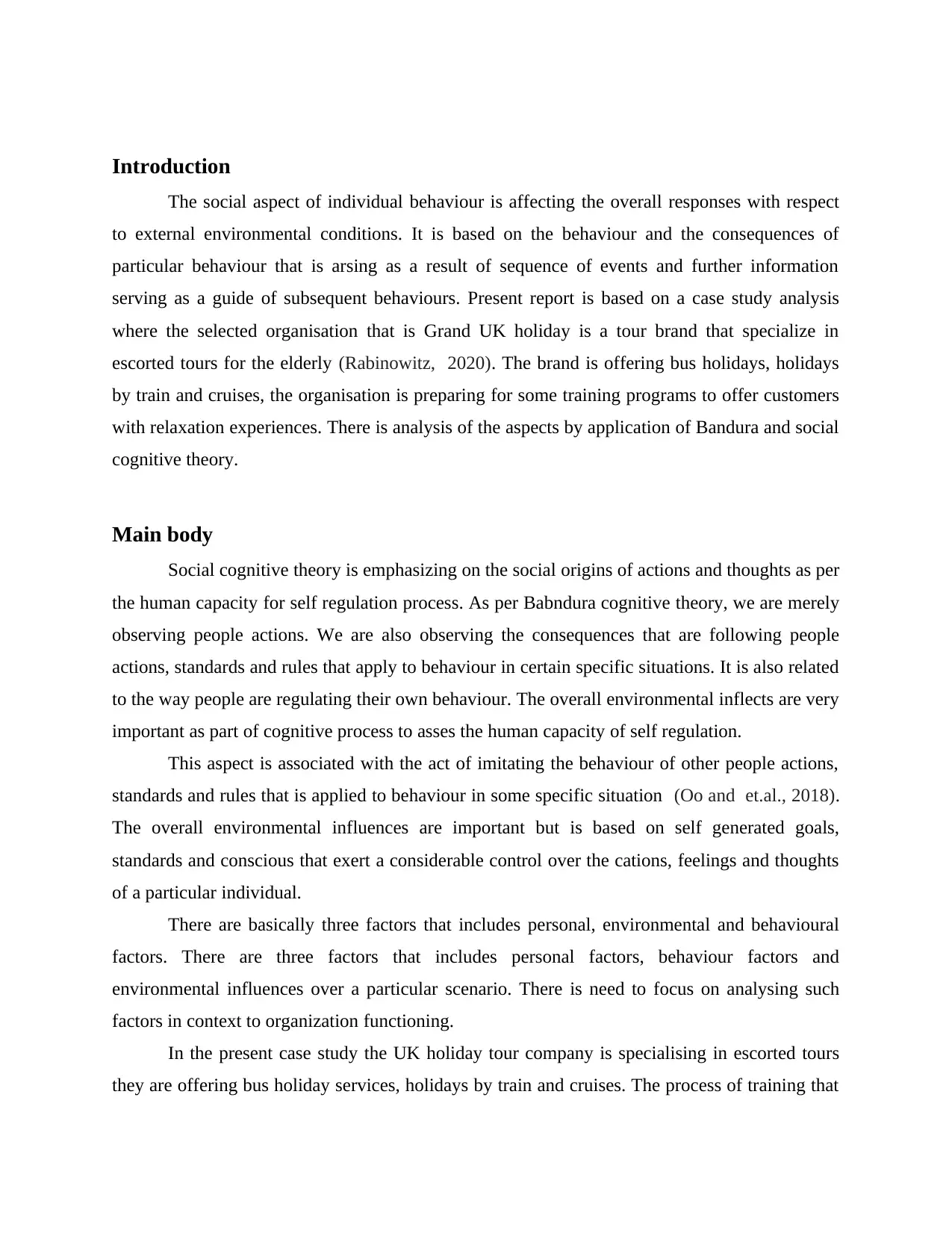
Introduction
The social aspect of individual behaviour is affecting the overall responses with respect
to external environmental conditions. It is based on the behaviour and the consequences of
particular behaviour that is arsing as a result of sequence of events and further information
serving as a guide of subsequent behaviours. Present report is based on a case study analysis
where the selected organisation that is Grand UK holiday is a tour brand that specialize in
escorted tours for the elderly (Rabinowitz, 2020). The brand is offering bus holidays, holidays
by train and cruises, the organisation is preparing for some training programs to offer customers
with relaxation experiences. There is analysis of the aspects by application of Bandura and social
cognitive theory.
Main body
Social cognitive theory is emphasizing on the social origins of actions and thoughts as per
the human capacity for self regulation process. As per Babndura cognitive theory, we are merely
observing people actions. We are also observing the consequences that are following people
actions, standards and rules that apply to behaviour in certain specific situations. It is also related
to the way people are regulating their own behaviour. The overall environmental inflects are very
important as part of cognitive process to asses the human capacity of self regulation.
This aspect is associated with the act of imitating the behaviour of other people actions,
standards and rules that is applied to behaviour in some specific situation (Oo and et.al., 2018).
The overall environmental influences are important but is based on self generated goals,
standards and conscious that exert a considerable control over the cations, feelings and thoughts
of a particular individual.
There are basically three factors that includes personal, environmental and behavioural
factors. There are three factors that includes personal factors, behaviour factors and
environmental influences over a particular scenario. There is need to focus on analysing such
factors in context to organization functioning.
In the present case study the UK holiday tour company is specialising in escorted tours
they are offering bus holiday services, holidays by train and cruises. The process of training that
The social aspect of individual behaviour is affecting the overall responses with respect
to external environmental conditions. It is based on the behaviour and the consequences of
particular behaviour that is arsing as a result of sequence of events and further information
serving as a guide of subsequent behaviours. Present report is based on a case study analysis
where the selected organisation that is Grand UK holiday is a tour brand that specialize in
escorted tours for the elderly (Rabinowitz, 2020). The brand is offering bus holidays, holidays
by train and cruises, the organisation is preparing for some training programs to offer customers
with relaxation experiences. There is analysis of the aspects by application of Bandura and social
cognitive theory.
Main body
Social cognitive theory is emphasizing on the social origins of actions and thoughts as per
the human capacity for self regulation process. As per Babndura cognitive theory, we are merely
observing people actions. We are also observing the consequences that are following people
actions, standards and rules that apply to behaviour in certain specific situations. It is also related
to the way people are regulating their own behaviour. The overall environmental inflects are very
important as part of cognitive process to asses the human capacity of self regulation.
This aspect is associated with the act of imitating the behaviour of other people actions,
standards and rules that is applied to behaviour in some specific situation (Oo and et.al., 2018).
The overall environmental influences are important but is based on self generated goals,
standards and conscious that exert a considerable control over the cations, feelings and thoughts
of a particular individual.
There are basically three factors that includes personal, environmental and behavioural
factors. There are three factors that includes personal factors, behaviour factors and
environmental influences over a particular scenario. There is need to focus on analysing such
factors in context to organization functioning.
In the present case study the UK holiday tour company is specialising in escorted tours
they are offering bus holiday services, holidays by train and cruises. The process of training that
⊘ This is a preview!⊘
Do you want full access?
Subscribe today to unlock all pages.

Trusted by 1+ million students worldwide
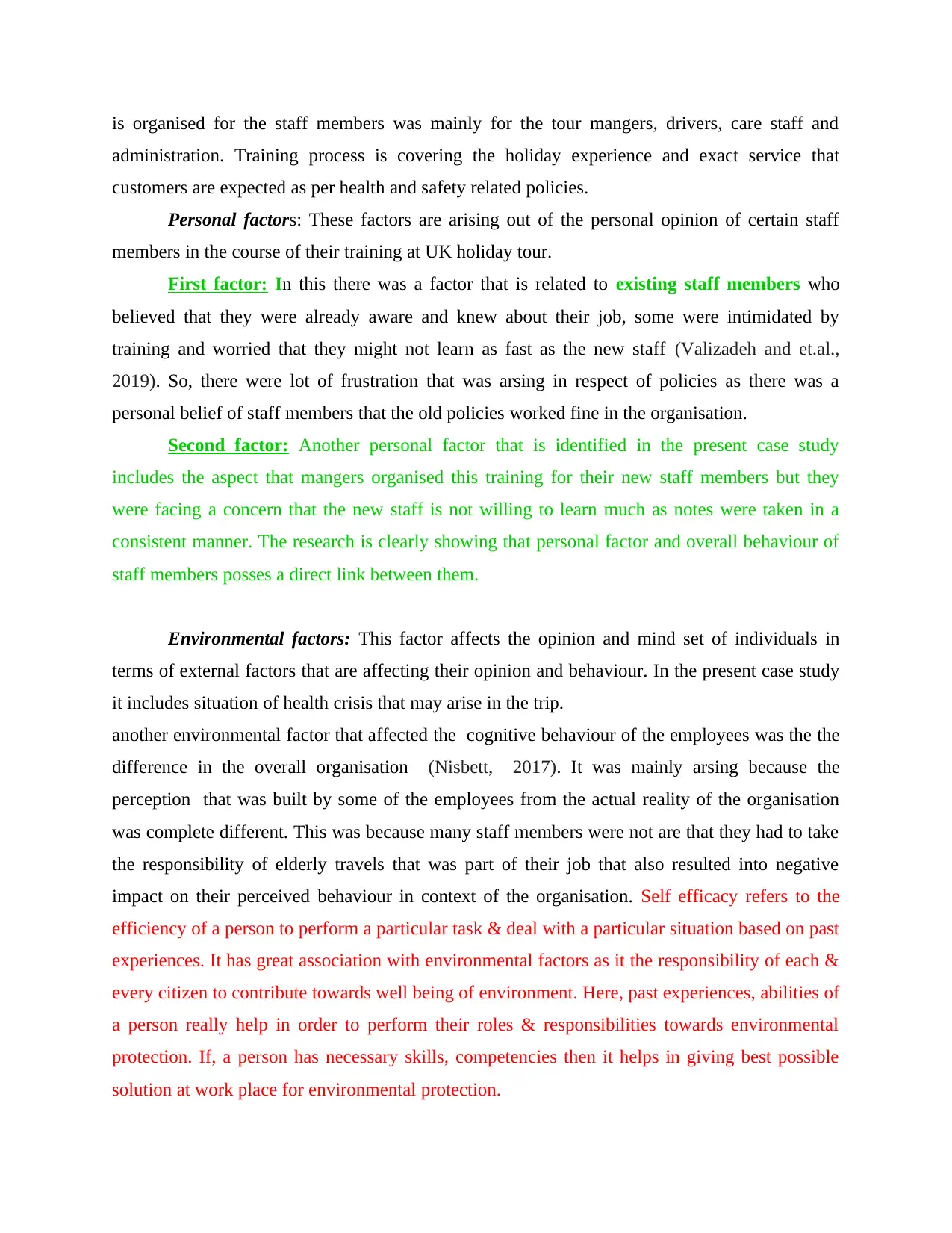
is organised for the staff members was mainly for the tour mangers, drivers, care staff and
administration. Training process is covering the holiday experience and exact service that
customers are expected as per health and safety related policies.
Personal factors: These factors are arising out of the personal opinion of certain staff
members in the course of their training at UK holiday tour.
First factor: In this there was a factor that is related to existing staff members who
believed that they were already aware and knew about their job, some were intimidated by
training and worried that they might not learn as fast as the new staff (Valizadeh and et.al.,
2019). So, there were lot of frustration that was arsing in respect of policies as there was a
personal belief of staff members that the old policies worked fine in the organisation.
Second factor: Another personal factor that is identified in the present case study
includes the aspect that mangers organised this training for their new staff members but they
were facing a concern that the new staff is not willing to learn much as notes were taken in a
consistent manner. The research is clearly showing that personal factor and overall behaviour of
staff members posses a direct link between them.
Environmental factors: This factor affects the opinion and mind set of individuals in
terms of external factors that are affecting their opinion and behaviour. In the present case study
it includes situation of health crisis that may arise in the trip.
another environmental factor that affected the cognitive behaviour of the employees was the the
difference in the overall organisation (Nisbett, 2017). It was mainly arsing because the
perception that was built by some of the employees from the actual reality of the organisation
was complete different. This was because many staff members were not are that they had to take
the responsibility of elderly travels that was part of their job that also resulted into negative
impact on their perceived behaviour in context of the organisation. Self efficacy refers to the
efficiency of a person to perform a particular task & deal with a particular situation based on past
experiences. It has great association with environmental factors as it the responsibility of each &
every citizen to contribute towards well being of environment. Here, past experiences, abilities of
a person really help in order to perform their roles & responsibilities towards environmental
protection. If, a person has necessary skills, competencies then it helps in giving best possible
solution at work place for environmental protection.
administration. Training process is covering the holiday experience and exact service that
customers are expected as per health and safety related policies.
Personal factors: These factors are arising out of the personal opinion of certain staff
members in the course of their training at UK holiday tour.
First factor: In this there was a factor that is related to existing staff members who
believed that they were already aware and knew about their job, some were intimidated by
training and worried that they might not learn as fast as the new staff (Valizadeh and et.al.,
2019). So, there were lot of frustration that was arsing in respect of policies as there was a
personal belief of staff members that the old policies worked fine in the organisation.
Second factor: Another personal factor that is identified in the present case study
includes the aspect that mangers organised this training for their new staff members but they
were facing a concern that the new staff is not willing to learn much as notes were taken in a
consistent manner. The research is clearly showing that personal factor and overall behaviour of
staff members posses a direct link between them.
Environmental factors: This factor affects the opinion and mind set of individuals in
terms of external factors that are affecting their opinion and behaviour. In the present case study
it includes situation of health crisis that may arise in the trip.
another environmental factor that affected the cognitive behaviour of the employees was the the
difference in the overall organisation (Nisbett, 2017). It was mainly arsing because the
perception that was built by some of the employees from the actual reality of the organisation
was complete different. This was because many staff members were not are that they had to take
the responsibility of elderly travels that was part of their job that also resulted into negative
impact on their perceived behaviour in context of the organisation. Self efficacy refers to the
efficiency of a person to perform a particular task & deal with a particular situation based on past
experiences. It has great association with environmental factors as it the responsibility of each &
every citizen to contribute towards well being of environment. Here, past experiences, abilities of
a person really help in order to perform their roles & responsibilities towards environmental
protection. If, a person has necessary skills, competencies then it helps in giving best possible
solution at work place for environmental protection.
Paraphrase This Document
Need a fresh take? Get an instant paraphrase of this document with our AI Paraphraser
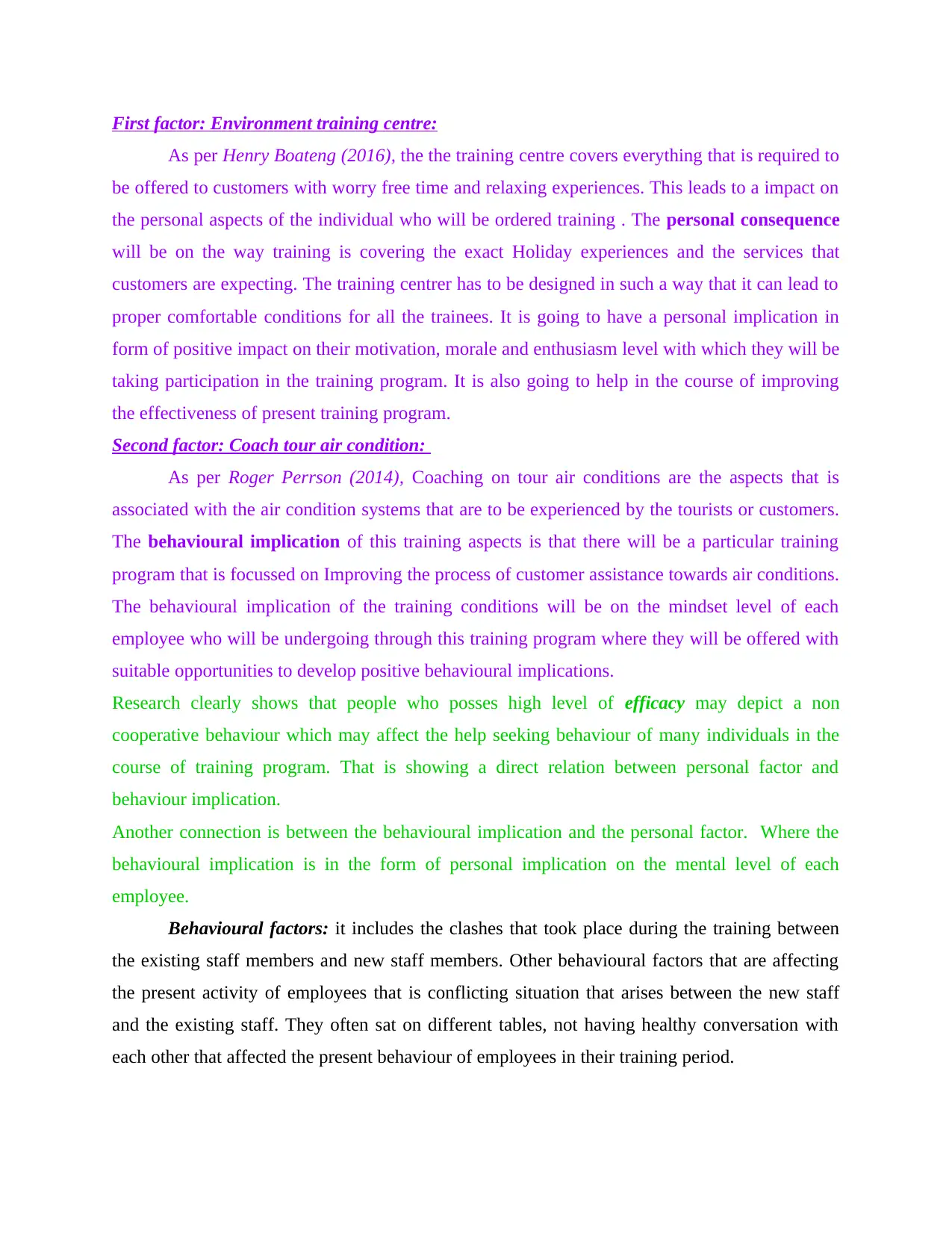
First factor: Environment training centre:
As per Henry Boateng (2016), the the training centre covers everything that is required to
be offered to customers with worry free time and relaxing experiences. This leads to a impact on
the personal aspects of the individual who will be ordered training . The personal consequence
will be on the way training is covering the exact Holiday experiences and the services that
customers are expecting. The training centrer has to be designed in such a way that it can lead to
proper comfortable conditions for all the trainees. It is going to have a personal implication in
form of positive impact on their motivation, morale and enthusiasm level with which they will be
taking participation in the training program. It is also going to help in the course of improving
the effectiveness of present training program.
Second factor: Coach tour air condition:
As per Roger Perrson (2014), Coaching on tour air conditions are the aspects that is
associated with the air condition systems that are to be experienced by the tourists or customers.
The behavioural implication of this training aspects is that there will be a particular training
program that is focussed on Improving the process of customer assistance towards air conditions.
The behavioural implication of the training conditions will be on the mindset level of each
employee who will be undergoing through this training program where they will be offered with
suitable opportunities to develop positive behavioural implications.
Research clearly shows that people who posses high level of efficacy may depict a non
cooperative behaviour which may affect the help seeking behaviour of many individuals in the
course of training program. That is showing a direct relation between personal factor and
behaviour implication.
Another connection is between the behavioural implication and the personal factor. Where the
behavioural implication is in the form of personal implication on the mental level of each
employee.
Behavioural factors: it includes the clashes that took place during the training between
the existing staff members and new staff members. Other behavioural factors that are affecting
the present activity of employees that is conflicting situation that arises between the new staff
and the existing staff. They often sat on different tables, not having healthy conversation with
each other that affected the present behaviour of employees in their training period.
As per Henry Boateng (2016), the the training centre covers everything that is required to
be offered to customers with worry free time and relaxing experiences. This leads to a impact on
the personal aspects of the individual who will be ordered training . The personal consequence
will be on the way training is covering the exact Holiday experiences and the services that
customers are expecting. The training centrer has to be designed in such a way that it can lead to
proper comfortable conditions for all the trainees. It is going to have a personal implication in
form of positive impact on their motivation, morale and enthusiasm level with which they will be
taking participation in the training program. It is also going to help in the course of improving
the effectiveness of present training program.
Second factor: Coach tour air condition:
As per Roger Perrson (2014), Coaching on tour air conditions are the aspects that is
associated with the air condition systems that are to be experienced by the tourists or customers.
The behavioural implication of this training aspects is that there will be a particular training
program that is focussed on Improving the process of customer assistance towards air conditions.
The behavioural implication of the training conditions will be on the mindset level of each
employee who will be undergoing through this training program where they will be offered with
suitable opportunities to develop positive behavioural implications.
Research clearly shows that people who posses high level of efficacy may depict a non
cooperative behaviour which may affect the help seeking behaviour of many individuals in the
course of training program. That is showing a direct relation between personal factor and
behaviour implication.
Another connection is between the behavioural implication and the personal factor. Where the
behavioural implication is in the form of personal implication on the mental level of each
employee.
Behavioural factors: it includes the clashes that took place during the training between
the existing staff members and new staff members. Other behavioural factors that are affecting
the present activity of employees that is conflicting situation that arises between the new staff
and the existing staff. They often sat on different tables, not having healthy conversation with
each other that affected the present behaviour of employees in their training period.
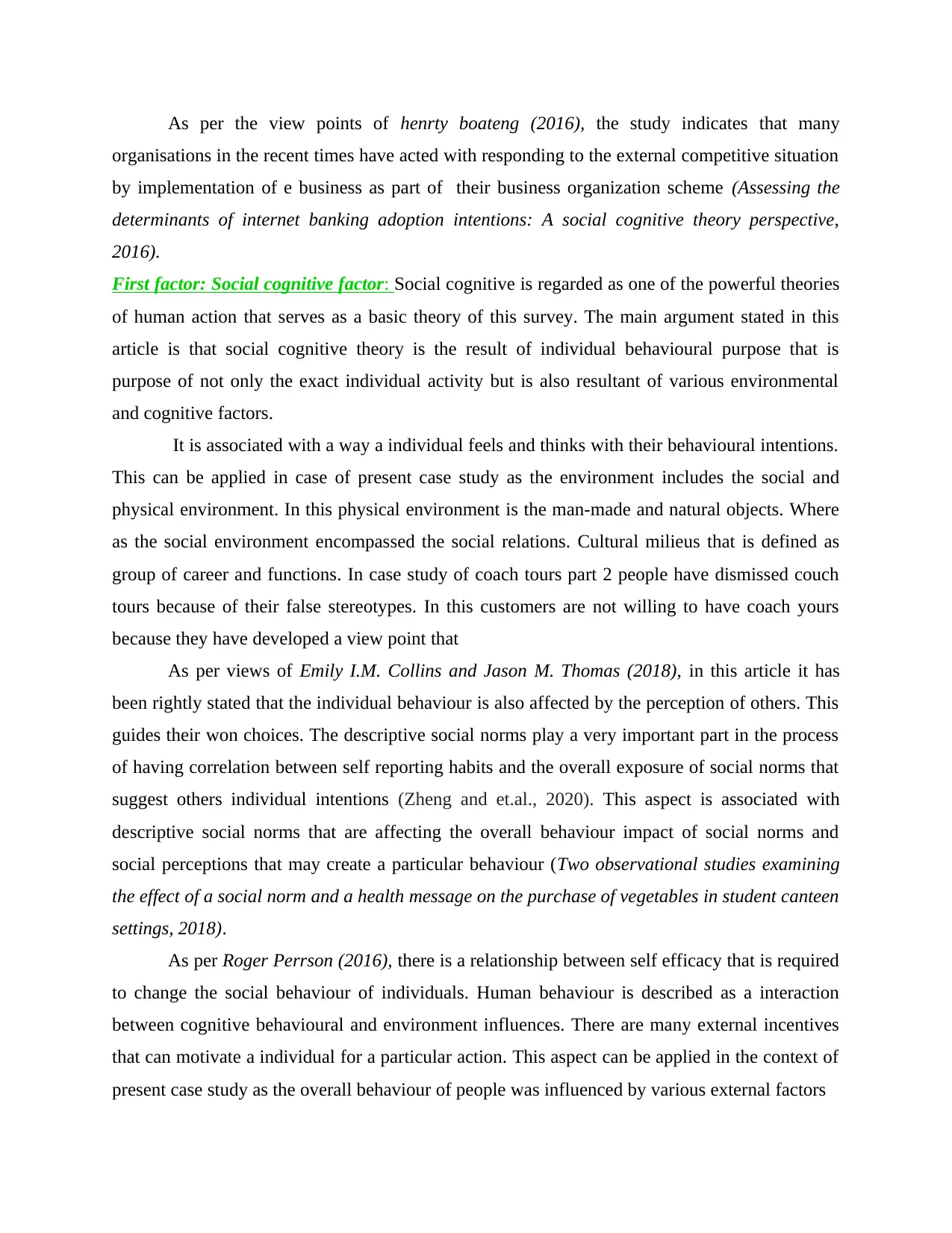
As per the view points of henrty boateng (2016), the study indicates that many
organisations in the recent times have acted with responding to the external competitive situation
by implementation of e business as part of their business organization scheme (Assessing the
determinants of internet banking adoption intentions: A social cognitive theory perspective,
2016).
First factor: Social cognitive factor: Social cognitive is regarded as one of the powerful theories
of human action that serves as a basic theory of this survey. The main argument stated in this
article is that social cognitive theory is the result of individual behavioural purpose that is
purpose of not only the exact individual activity but is also resultant of various environmental
and cognitive factors.
It is associated with a way a individual feels and thinks with their behavioural intentions.
This can be applied in case of present case study as the environment includes the social and
physical environment. In this physical environment is the man-made and natural objects. Where
as the social environment encompassed the social relations. Cultural milieus that is defined as
group of career and functions. In case study of coach tours part 2 people have dismissed couch
tours because of their false stereotypes. In this customers are not willing to have coach yours
because they have developed a view point that
As per views of Emily I.M. Collins and Jason M. Thomas (2018), in this article it has
been rightly stated that the individual behaviour is also affected by the perception of others. This
guides their won choices. The descriptive social norms play a very important part in the process
of having correlation between self reporting habits and the overall exposure of social norms that
suggest others individual intentions (Zheng and et.al., 2020). This aspect is associated with
descriptive social norms that are affecting the overall behaviour impact of social norms and
social perceptions that may create a particular behaviour (Two observational studies examining
the effect of a social norm and a health message on the purchase of vegetables in student canteen
settings, 2018).
As per Roger Perrson (2016), there is a relationship between self efficacy that is required
to change the social behaviour of individuals. Human behaviour is described as a interaction
between cognitive behavioural and environment influences. There are many external incentives
that can motivate a individual for a particular action. This aspect can be applied in the context of
present case study as the overall behaviour of people was influenced by various external factors
organisations in the recent times have acted with responding to the external competitive situation
by implementation of e business as part of their business organization scheme (Assessing the
determinants of internet banking adoption intentions: A social cognitive theory perspective,
2016).
First factor: Social cognitive factor: Social cognitive is regarded as one of the powerful theories
of human action that serves as a basic theory of this survey. The main argument stated in this
article is that social cognitive theory is the result of individual behavioural purpose that is
purpose of not only the exact individual activity but is also resultant of various environmental
and cognitive factors.
It is associated with a way a individual feels and thinks with their behavioural intentions.
This can be applied in case of present case study as the environment includes the social and
physical environment. In this physical environment is the man-made and natural objects. Where
as the social environment encompassed the social relations. Cultural milieus that is defined as
group of career and functions. In case study of coach tours part 2 people have dismissed couch
tours because of their false stereotypes. In this customers are not willing to have coach yours
because they have developed a view point that
As per views of Emily I.M. Collins and Jason M. Thomas (2018), in this article it has
been rightly stated that the individual behaviour is also affected by the perception of others. This
guides their won choices. The descriptive social norms play a very important part in the process
of having correlation between self reporting habits and the overall exposure of social norms that
suggest others individual intentions (Zheng and et.al., 2020). This aspect is associated with
descriptive social norms that are affecting the overall behaviour impact of social norms and
social perceptions that may create a particular behaviour (Two observational studies examining
the effect of a social norm and a health message on the purchase of vegetables in student canteen
settings, 2018).
As per Roger Perrson (2016), there is a relationship between self efficacy that is required
to change the social behaviour of individuals. Human behaviour is described as a interaction
between cognitive behavioural and environment influences. There are many external incentives
that can motivate a individual for a particular action. This aspect can be applied in the context of
present case study as the overall behaviour of people was influenced by various external factors
⊘ This is a preview!⊘
Do you want full access?
Subscribe today to unlock all pages.

Trusted by 1+ million students worldwide
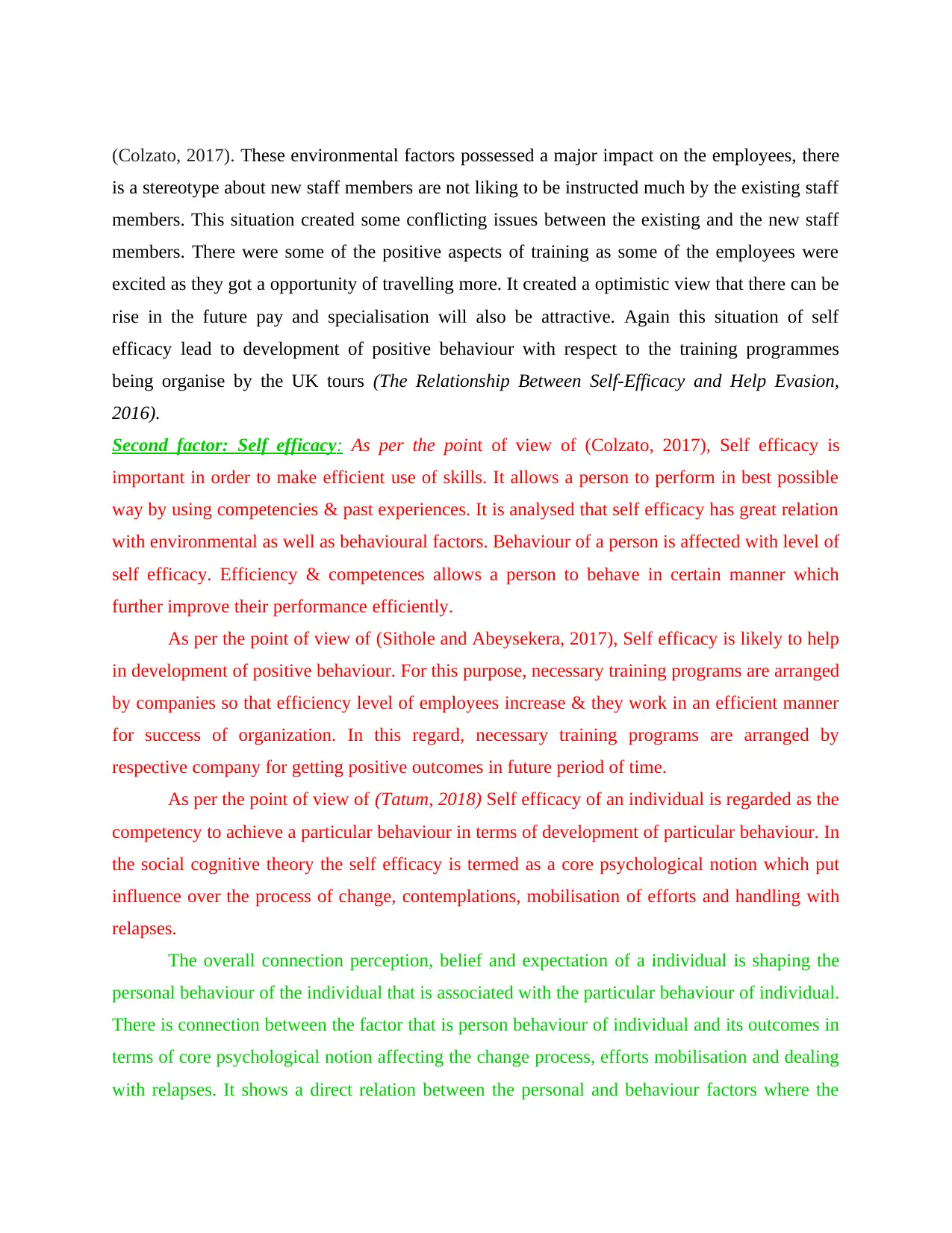
(Colzato, 2017). These environmental factors possessed a major impact on the employees, there
is a stereotype about new staff members are not liking to be instructed much by the existing staff
members. This situation created some conflicting issues between the existing and the new staff
members. There were some of the positive aspects of training as some of the employees were
excited as they got a opportunity of travelling more. It created a optimistic view that there can be
rise in the future pay and specialisation will also be attractive. Again this situation of self
efficacy lead to development of positive behaviour with respect to the training programmes
being organise by the UK tours (The Relationship Between Self-Efficacy and Help Evasion,
2016).
Second factor: Self efficacy: As per the point of view of (Colzato, 2017), Self efficacy is
important in order to make efficient use of skills. It allows a person to perform in best possible
way by using competencies & past experiences. It is analysed that self efficacy has great relation
with environmental as well as behavioural factors. Behaviour of a person is affected with level of
self efficacy. Efficiency & competences allows a person to behave in certain manner which
further improve their performance efficiently.
As per the point of view of (Sithole and Abeysekera, 2017), Self efficacy is likely to help
in development of positive behaviour. For this purpose, necessary training programs are arranged
by companies so that efficiency level of employees increase & they work in an efficient manner
for success of organization. In this regard, necessary training programs are arranged by
respective company for getting positive outcomes in future period of time.
As per the point of view of (Tatum, 2018) Self efficacy of an individual is regarded as the
competency to achieve a particular behaviour in terms of development of particular behaviour. In
the social cognitive theory the self efficacy is termed as a core psychological notion which put
influence over the process of change, contemplations, mobilisation of efforts and handling with
relapses.
The overall connection perception, belief and expectation of a individual is shaping the
personal behaviour of the individual that is associated with the particular behaviour of individual.
There is connection between the factor that is person behaviour of individual and its outcomes in
terms of core psychological notion affecting the change process, efforts mobilisation and dealing
with relapses. It shows a direct relation between the personal and behaviour factors where the
is a stereotype about new staff members are not liking to be instructed much by the existing staff
members. This situation created some conflicting issues between the existing and the new staff
members. There were some of the positive aspects of training as some of the employees were
excited as they got a opportunity of travelling more. It created a optimistic view that there can be
rise in the future pay and specialisation will also be attractive. Again this situation of self
efficacy lead to development of positive behaviour with respect to the training programmes
being organise by the UK tours (The Relationship Between Self-Efficacy and Help Evasion,
2016).
Second factor: Self efficacy: As per the point of view of (Colzato, 2017), Self efficacy is
important in order to make efficient use of skills. It allows a person to perform in best possible
way by using competencies & past experiences. It is analysed that self efficacy has great relation
with environmental as well as behavioural factors. Behaviour of a person is affected with level of
self efficacy. Efficiency & competences allows a person to behave in certain manner which
further improve their performance efficiently.
As per the point of view of (Sithole and Abeysekera, 2017), Self efficacy is likely to help
in development of positive behaviour. For this purpose, necessary training programs are arranged
by companies so that efficiency level of employees increase & they work in an efficient manner
for success of organization. In this regard, necessary training programs are arranged by
respective company for getting positive outcomes in future period of time.
As per the point of view of (Tatum, 2018) Self efficacy of an individual is regarded as the
competency to achieve a particular behaviour in terms of development of particular behaviour. In
the social cognitive theory the self efficacy is termed as a core psychological notion which put
influence over the process of change, contemplations, mobilisation of efforts and handling with
relapses.
The overall connection perception, belief and expectation of a individual is shaping the
personal behaviour of the individual that is associated with the particular behaviour of individual.
There is connection between the factor that is person behaviour of individual and its outcomes in
terms of core psychological notion affecting the change process, efforts mobilisation and dealing
with relapses. It shows a direct relation between the personal and behaviour factors where the
Paraphrase This Document
Need a fresh take? Get an instant paraphrase of this document with our AI Paraphraser
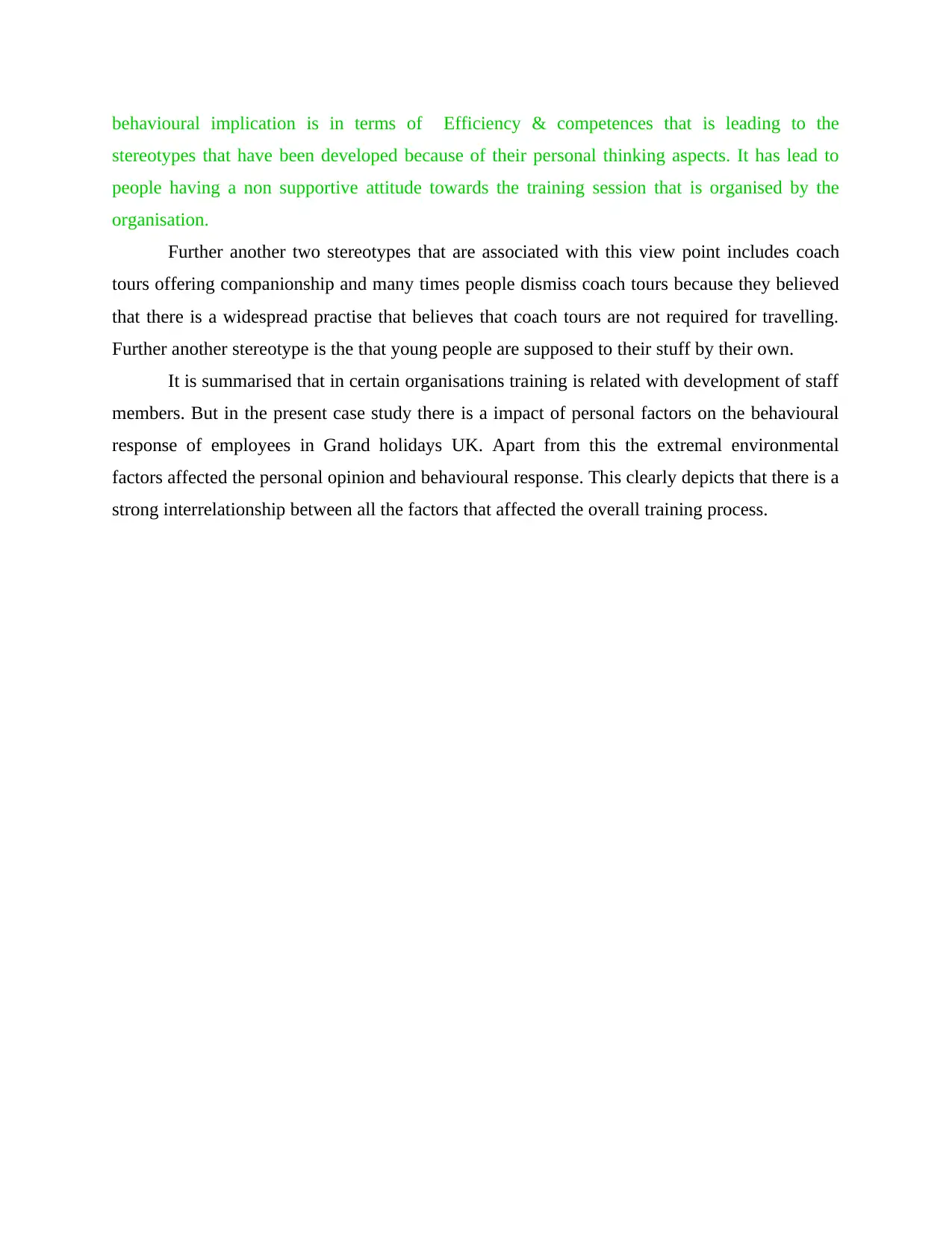
behavioural implication is in terms of Efficiency & competences that is leading to the
stereotypes that have been developed because of their personal thinking aspects. It has lead to
people having a non supportive attitude towards the training session that is organised by the
organisation.
Further another two stereotypes that are associated with this view point includes coach
tours offering companionship and many times people dismiss coach tours because they believed
that there is a widespread practise that believes that coach tours are not required for travelling.
Further another stereotype is the that young people are supposed to their stuff by their own.
It is summarised that in certain organisations training is related with development of staff
members. But in the present case study there is a impact of personal factors on the behavioural
response of employees in Grand holidays UK. Apart from this the extremal environmental
factors affected the personal opinion and behavioural response. This clearly depicts that there is a
strong interrelationship between all the factors that affected the overall training process.
stereotypes that have been developed because of their personal thinking aspects. It has lead to
people having a non supportive attitude towards the training session that is organised by the
organisation.
Further another two stereotypes that are associated with this view point includes coach
tours offering companionship and many times people dismiss coach tours because they believed
that there is a widespread practise that believes that coach tours are not required for travelling.
Further another stereotype is the that young people are supposed to their stuff by their own.
It is summarised that in certain organisations training is related with development of staff
members. But in the present case study there is a impact of personal factors on the behavioural
response of employees in Grand holidays UK. Apart from this the extremal environmental
factors affected the personal opinion and behavioural response. This clearly depicts that there is a
strong interrelationship between all the factors that affected the overall training process.
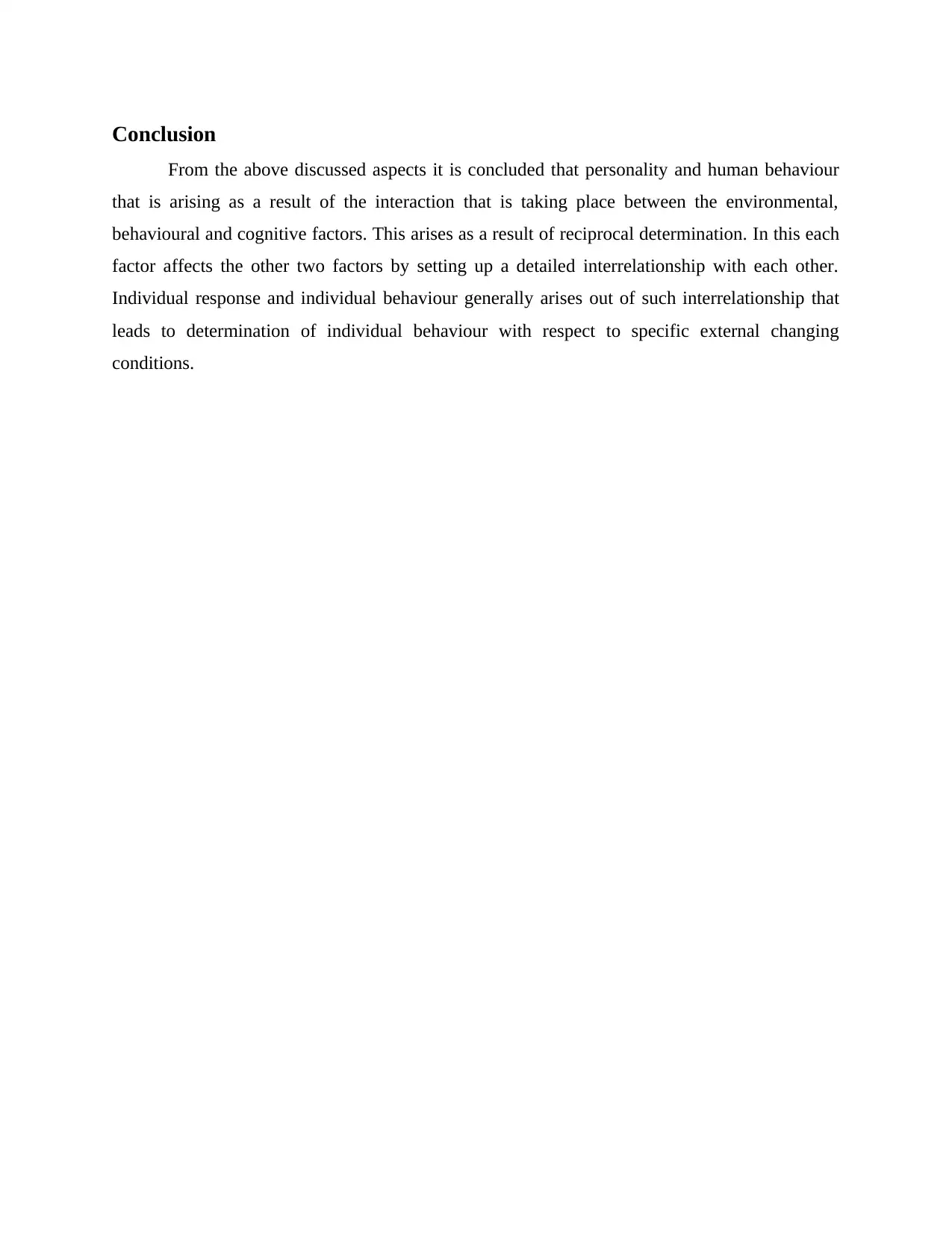
Conclusion
From the above discussed aspects it is concluded that personality and human behaviour
that is arising as a result of the interaction that is taking place between the environmental,
behavioural and cognitive factors. This arises as a result of reciprocal determination. In this each
factor affects the other two factors by setting up a detailed interrelationship with each other.
Individual response and individual behaviour generally arises out of such interrelationship that
leads to determination of individual behaviour with respect to specific external changing
conditions.
From the above discussed aspects it is concluded that personality and human behaviour
that is arising as a result of the interaction that is taking place between the environmental,
behavioural and cognitive factors. This arises as a result of reciprocal determination. In this each
factor affects the other two factors by setting up a detailed interrelationship with each other.
Individual response and individual behaviour generally arises out of such interrelationship that
leads to determination of individual behaviour with respect to specific external changing
conditions.
⊘ This is a preview!⊘
Do you want full access?
Subscribe today to unlock all pages.

Trusted by 1+ million students worldwide
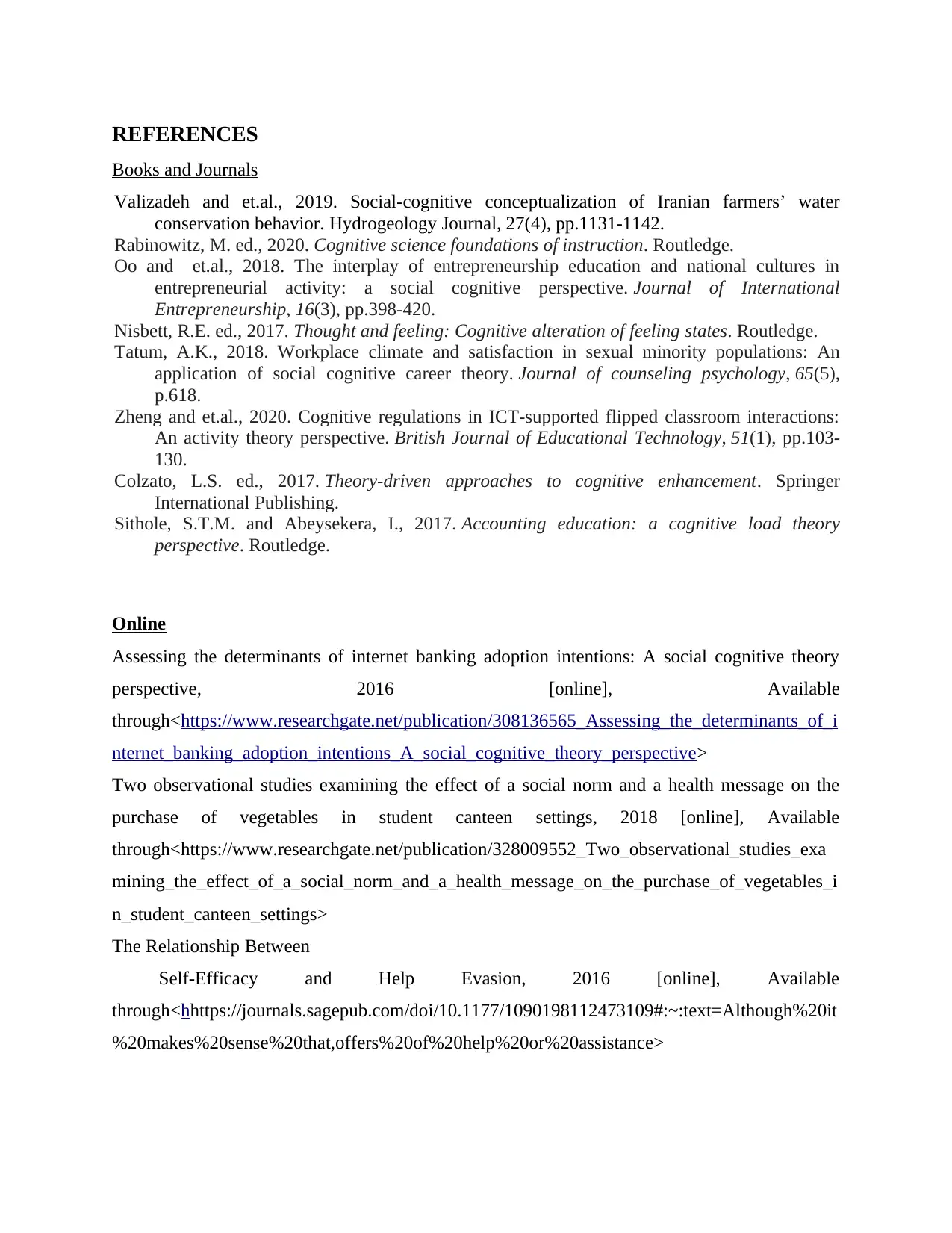
REFERENCES
Books and Journals
Valizadeh and et.al., 2019. Social-cognitive conceptualization of Iranian farmers’ water
conservation behavior. Hydrogeology Journal, 27(4), pp.1131-1142.
Rabinowitz, M. ed., 2020. Cognitive science foundations of instruction. Routledge.
Oo and et.al., 2018. The interplay of entrepreneurship education and national cultures in
entrepreneurial activity: a social cognitive perspective. Journal of International
Entrepreneurship, 16(3), pp.398-420.
Nisbett, R.E. ed., 2017. Thought and feeling: Cognitive alteration of feeling states. Routledge.
Tatum, A.K., 2018. Workplace climate and satisfaction in sexual minority populations: An
application of social cognitive career theory. Journal of counseling psychology, 65(5),
p.618.
Zheng and et.al., 2020. Cognitive regulations in ICT‐supported flipped classroom interactions:
An activity theory perspective. British Journal of Educational Technology, 51(1), pp.103-
130.
Colzato, L.S. ed., 2017. Theory-driven approaches to cognitive enhancement. Springer
International Publishing.
Sithole, S.T.M. and Abeysekera, I., 2017. Accounting education: a cognitive load theory
perspective. Routledge.
Online
Assessing the determinants of internet banking adoption intentions: A social cognitive theory
perspective, 2016 [online], Available
through<https://www.researchgate.net/publication/308136565_Assessing_the_determinants_of_i
nternet_banking_adoption_intentions_A_social_cognitive_theory_perspective>
Two observational studies examining the effect of a social norm and a health message on the
purchase of vegetables in student canteen settings, 2018 [online], Available
through<https://www.researchgate.net/publication/328009552_Two_observational_studies_exa
mining_the_effect_of_a_social_norm_and_a_health_message_on_the_purchase_of_vegetables_i
n_student_canteen_settings>
The Relationship Between
Self-Efficacy and Help Evasion, 2016 [online], Available
through<hhttps://journals.sagepub.com/doi/10.1177/1090198112473109#:~:text=Although%20it
%20makes%20sense%20that,offers%20of%20help%20or%20assistance>
Books and Journals
Valizadeh and et.al., 2019. Social-cognitive conceptualization of Iranian farmers’ water
conservation behavior. Hydrogeology Journal, 27(4), pp.1131-1142.
Rabinowitz, M. ed., 2020. Cognitive science foundations of instruction. Routledge.
Oo and et.al., 2018. The interplay of entrepreneurship education and national cultures in
entrepreneurial activity: a social cognitive perspective. Journal of International
Entrepreneurship, 16(3), pp.398-420.
Nisbett, R.E. ed., 2017. Thought and feeling: Cognitive alteration of feeling states. Routledge.
Tatum, A.K., 2018. Workplace climate and satisfaction in sexual minority populations: An
application of social cognitive career theory. Journal of counseling psychology, 65(5),
p.618.
Zheng and et.al., 2020. Cognitive regulations in ICT‐supported flipped classroom interactions:
An activity theory perspective. British Journal of Educational Technology, 51(1), pp.103-
130.
Colzato, L.S. ed., 2017. Theory-driven approaches to cognitive enhancement. Springer
International Publishing.
Sithole, S.T.M. and Abeysekera, I., 2017. Accounting education: a cognitive load theory
perspective. Routledge.
Online
Assessing the determinants of internet banking adoption intentions: A social cognitive theory
perspective, 2016 [online], Available
through<https://www.researchgate.net/publication/308136565_Assessing_the_determinants_of_i
nternet_banking_adoption_intentions_A_social_cognitive_theory_perspective>
Two observational studies examining the effect of a social norm and a health message on the
purchase of vegetables in student canteen settings, 2018 [online], Available
through<https://www.researchgate.net/publication/328009552_Two_observational_studies_exa
mining_the_effect_of_a_social_norm_and_a_health_message_on_the_purchase_of_vegetables_i
n_student_canteen_settings>
The Relationship Between
Self-Efficacy and Help Evasion, 2016 [online], Available
through<hhttps://journals.sagepub.com/doi/10.1177/1090198112473109#:~:text=Although%20it
%20makes%20sense%20that,offers%20of%20help%20or%20assistance>
Paraphrase This Document
Need a fresh take? Get an instant paraphrase of this document with our AI Paraphraser


⊘ This is a preview!⊘
Do you want full access?
Subscribe today to unlock all pages.

Trusted by 1+ million students worldwide
1 out of 12
Related Documents
Your All-in-One AI-Powered Toolkit for Academic Success.
+13062052269
info@desklib.com
Available 24*7 on WhatsApp / Email
![[object Object]](/_next/static/media/star-bottom.7253800d.svg)
Unlock your academic potential
Copyright © 2020–2026 A2Z Services. All Rights Reserved. Developed and managed by ZUCOL.




